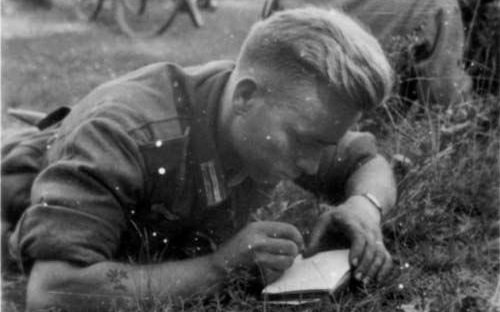Inspiring story of forbidden love discovered in World War Two letters between two men

An epic story of forbidden love has been uncovered in letters exchanged between two men during the Second World War.
Mark Hignett, from Oswestry, Shropshire, initially bought three letters to put on display in his local history museum, exchanged between reluctant World War II soldier Gilbert Bradley, and his sweetheart, known only a ‘G’.
As he followed the love affair, Hignett spent more than £1,000 on eBay tracking down 300 letters exchanged between the pair between 1939 and 1944 – but it was only as he read more of Gilbert and ‘G’s story that he realised the relationship was in fact a forbidden one.
Forbidden, because ‘G ‘ was a man: a man named Gordon Bowsher, who had become involved with Gilbert after meeting on a houseboat in 1938.
The collection of exchanges between the two men now stands as a priceless insight into gay life during an era when homosexuality was illegal in Britain, and men in the British military could even face being shot for engaging in homosexual sexual activity.
February 12 1940 – Park Grange
My own darling boy,
There is nothing more than I desire in life but to have you with me constantly…
…I can see or I imagine I can see, what your mother and father’s reaction would be… the rest of the world have no conception of what our love is – they do not know that it is love…
The content of the letters only came to light after Gilbert’s death in 2008, at the age of 92. Gordon reportedly passed away 15 years earlier. Sadly, the couple did not remain together – though the reasons for their split are unknown.
“The value of these letters lies in the fact most love letters from homosexuals at the time were burned, because if they were found, they would have been used as evidence,” Mr Hignett told Metro.
“We think their mums knew they were gay, but there’s reference to not ever letting Gilbert’s dad find out,” he continues. “The letters are full of humour and they weren’t suppressed in any way.
“They talked about keeping their relationship secret, but they openly talked about friends who were gay.”
February 1st, 1941 – K . C. Gloucester Regiment, Priors Road, Cheltenham
My darling boy,
For years I had it drummed into me that no love could last for life…
I want you darling seriously to delve into your own mind, and to look for once in to the future.
Imagine the time when the war is over and we are living together… would it not be better to live on from now on the memory of our life together when it was at its most golden pitch.
Your own G.
Gay rights activist Peter Roscoe tells the BBC the letters are notable for their positive portrayal of same-sex relationships during the dark years of criminality.
“There is a gay history and it isn’t always negative and tearful,” he says. “So many stories are about arrests – Oscar Wilde, Reading Gaol and all those awful, awful stories.
“But despite all the awful circumstances, gay men and lesbians managed to rise above it all and have fascinating and good lives.”
Hignett says he is working with the museum to write a book telling Gilbert’s life story, while the love letters themselves will go on display at the museum.
In a moving foreshadowing of events to come, one of the letters ends thus: “Wouldn’t it be wonderful if all our letters could be published in the future in a more enlightened time. Then all the world could see how in love we are.”
It might have taken more than 70 years, but see we do.
More stories:
21 questions with Lady Bunny
Colton Haynes shares cute-as-hell bedroom snap with new boyfriend
